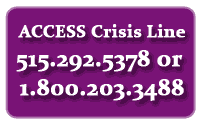What To Do?
If Someone Needs Help
If You Know Someone Who Has Been Abused
- Believe them.
- Listen -- without judging.
- Let them know that you support and care about them, that they are not responsible for the violence.
- Let them know that it is likely that in spite of promises, the violence will continue and probably escalate.
- Emphasize that when they are ready, they can make a choice to leave the relationship and that there is help available.
- Let them know they are not alone.
- Let them know about ACCESS services.
- Tell them about our crisis number answered 24-hours a day.
Sexual Assault
If you have been sexually assaulted, you may find the following steps helpful:
- First, remember that what happened to you is not your fault. You did not cause an assault, and you did not deserve it. You have a right to be believed and to receive appropriate medical, emotional, and legal support if you choose such options.
- Story County SART services are available to all survivors of sexual assault ages 13 and older, even if the assault occurred several days, or even years, earlier. Services are free and confidential. Call Sexual Assault Support Services at 29-ALERT (292-5378) to learn more about your options.
- Get to a safe place.
- Do not change anything at the location where the assault occurred.
- Do not eat, drink, shower, douche, brush your teeth, go to the bathroom, or change your clothes. These activities could destroy physical evidence that may be helpful if you later decide to pursue legal action.
- Consider contacting Story County SART or one of its individual agencies. These agencies can provide you with medical attention, emotional support, and law enforcement services and can help you explore your various options.
- Even if you don’t want to file a police report, consider receiving medical attention. A SART nurse will help ensure that you are healthy, provide options to prevent pregnancy or sexually transmitted infections, and collect valuable evidence that may be useful in the future, even if you are unsure about pursuing legal action now. Physical evidence can only be collected for up to 72 hours after an assault, but a survivor has ten years to decide if she/he wants to pursue a criminal case (or ten years after one’s 18th birthday if the assault took place prior to the survivor turning 18).
- The medical exam and follow up visits are free in Iowa, even if you do not report the assault to the police.
- If you want to talk with an ACCESS volunteer about your experience or your options (which include the SART process), call Sexual Assault Support Services at 29-ALERT (292-5378). This volunteer can activate SART.
Safety Planning
Safety During an Explosive Incident
- Be aware of your surroundings…where are the exits? Stay away from the bathroom, kitchen, bedrooms or anywhere weapons might be available.
- Have a bag packed and easily accessible if you need to leave quickly. Practice how to get out of your home safely. Identify which doors, windows, elevators, or stairwell would be best.
- Have a packed bag ready and keep it easily accessible in order to leave quickly.
Make a plan for where you will go if you leave. - Devise a code word to use with your children, family, friends and neighbors when you need the police.
Preparing to Leave
- Open up a separate checking or savings account in your own name to start to establish or increase your independence.
- Make copies of keys, important papers and put them in a safe place.
- Stash extra money, medications and clothes in a safe but quickly accessible place.
- Keep all important numbers close at hand. Keep a calling card, change, or a cell phone around for emergencies.
Safety in Your Home
- Change the locks on your doors and buy additional locks and safety devices.
- Have an answering machine or caller ID to screen your calls.
- Inform neighbors and/or your landlord that your partner no longer lives with you and that they should call the police if they see your partner around.
- Safety at Work, School or in Public
- Decide who at work you will inform of your situation. Is there security in your building? Provide a picture of your batterer, if possible.
- Inform your children's school, day care, etc. about who has permission to pick up your children.
- If possible, have someone escort you to your car or bus and wait with you until you are safely en route.
- Use a variety of routes to get home.
Safety in Your Emotional Health
- If you have to communicate with your partner, determine the safest way to do so.
- Have positive thoughts about yourself and be assertive with others about your needs. Read books, articles and poems to help you feel stronger.
- Decide who you can call to talk with freely and openly, and who will give you the support you need.
- Consider attending support groups or seeking outside counseling.
- Safety with a Protective Order
- Keep your protective order with you at all times. Keep a copy in your car, purse, with your children and give a copy to a trusted neighbor or family member.
- Call the police if your partner breaks the protective order.
- Think of alternative ways to keep safe if the police do not respond right away.
- Inform family, friends, neighbors and your health care provider that you have a protective order in effect.
Checklist: What to Take When You Leave
- Drivers License
- Money
- Keys
- Pictures
- Social Security Card
- Credit Cards
- Medications
- Clothes
- Passports
- Checkbook
- Phone Card
- Address Book
- Car Registration
- Car Insurance Papers
- Health & Life Insurance Papers
- Medical Records for you and your children
- Birth Certificates (yours/your children's)
- Protective Order (if applicable)
- Divorce Papers
- Custody Papers
- Jewelry
- Children's Small Toys
Support Groups
Voices
Tuesday’s from 6:00-7:00
Please call 515.292.0500 for location.
A support group for survivors of sexual assault and their female friends or family members.
Empower
Tuesday’s at 4:30
Please call 515.292.0500 for location!
A support group for survivors of domestic violence.
SHARE
In Boone County, Tuesdays at 4:00 p.m.
In Greene County, Mondays 4-5 p.m.
Iowa Domestic Violence Hotline: 1.800.942.8028


